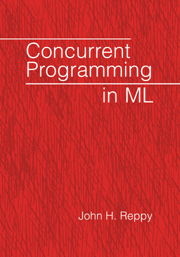Book contents
- Frontmatter
- Contents
- Preface
- Legend
- 1 Introduction
- 2 Concepts in Concurrent Programming
- 3 An Introduction to Concurrent ML
- 4 CML Programming Techniques
- 5 Synchronization and Communication Mechanisms
- 6 The Rationale for CML
- 7 A Software Build System
- 8 A Concurrent Window System
- 9 A CML Implementation of Linda
- 10 Implementing Concurrency in SML/NJ
- Appendix A A CML Reference
- Appendix B The Semantics of CML
- Bibliography
- Index
Preface
Published online by Cambridge University Press: 07 October 2009
- Frontmatter
- Contents
- Preface
- Legend
- 1 Introduction
- 2 Concepts in Concurrent Programming
- 3 An Introduction to Concurrent ML
- 4 CML Programming Techniques
- 5 Synchronization and Communication Mechanisms
- 6 The Rationale for CML
- 7 A Software Build System
- 8 A Concurrent Window System
- 9 A CML Implementation of Linda
- 10 Implementing Concurrency in SML/NJ
- Appendix A A CML Reference
- Appendix B The Semantics of CML
- Bibliography
- Index
Summary
This book is about the union of two important paradigms in programming languages, namely, higher-order languages and concurrent languages. Higher-order programming languages, often referred to as “functional programming” languages, are languages that support functions as first-class values. The language used here is the popular higher-order language Standard ML (SML) [MTH90, MTHM97], which is the most prominent member of the ML family of languages. In particular, the bulk of this book focuses on concurrent programming using the language Concurrent ML (CML), which extends SML with independent processes and higher-order communication and synchronization primitives. The power of CML is that a wide range of communication and synchronization abstractions can be programmed using a small collection of primitives.
A concurrent program is composed from two or more sequential programs, called processes, that execute (at least conceptually) in parallel. The sequential part of the execution of these processes is independent, but they also must interact via shared resources in order to collaborate on achieving their common purpose. In this book, we are concerned with the situation in which the concurrency and process interaction are explicit. This is in contrast with implicitly parallel languages, such as parallel functional languages [Hud89, Nik91, PvE93] and concurrent logic programming languages [Sha89]. The choice of language mechanisms used for process interaction is the key issue in concurrent programming language design.
- Type
- Chapter
- Information
- Concurrent Programming in ML , pp. ix - xivPublisher: Cambridge University PressPrint publication year: 1999



